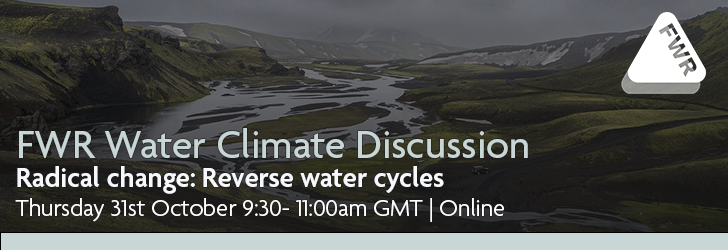Is climate change and the resulting loss in biodiversity irreversible? Will our current efforts to slow climate change be enough or do we need to consider radical change in our water systems?
IES/FWR would like your input as we decide whether abstracting water downstream of cities, treating it and pumping it upstream for human consumption might reverse the damage done to our rivers and natural environment. Traditionally we have abstracted upstream, where water is easier to treat and gravity can do the pumping for us. This seemed like the most sustainable solution, but our rivers are now struggling to cope with climate change and the increased demands of population growth. Given that we now have the technology to treat any water to potable standards and unlimited supplies of renewable energy, should we reverse this water cycle?
Join our discussion meeting to explore how the radical change idea of reversing water cycles could support improved climate mitigation, resilience and improved biodiversity.
Simon Spooner, FWR Chair will provide an introductory presentation on the topic:
In the last few centuries we have built a comfortable industrial society with combustion energy released from fossilised carbon. We feed ourselves by clearing land for our simplified farm ecosystems and pollute the world with chemicals, biological waste and plastics. Our water comes from reaching ever further upstream for fresh water and dumping our waste as close to our doorstep and with as little treatment as we can get away with.
We have now learned how to get the energy we need from renewable sources and to utilise it with electrical systems that cause little pollution; we are beginning to learn how to better manage land, giving space to other living things and to work with more diverse and complex ecosystems to provide both food and a wider range of ecosystem services. There is a great deal still to learn about how we must change our energy and food systems and then the vast challenge of building whole new infrastructure and land management systems. Our water systems have to undergo a radical rethink and change too - how do we transition from consuming and despoiling the water and the aquatic ecosystems to living as part of that system with infrastructure and behaviour that replenishes and enhances?
This event is being held as part of a series of Water Climate Discussions, exploring the questions: is unacceptable climate change now inevitable? Do we need to consider radical change to avert disaster, or (possibly more radically) do we need to slow down and take the public with us? You can join this year's Water Climate Discussions as we contemplate a number of ideas for radical change. Head to waterclimatediscussion.com where you can learn how to propose your own ideas for radical change or join in a number of different discussions like IES/FWR's on Reverse Water Cycles.
Our speakers

Martin Currie, Aqueum
Dr Martin Currie is an independent potable water quality and treatment specialist with Aqueum. He has been hosting the Water Climate Discussion since the run up to Glasgow's COP26 when the water sector got together to bring their voice to the climate discussion. Martin will be Chairing this event.
 Dr Ana Mijic, Imperial College London
Dr Ana Mijic, Imperial College London
Dr Ana Mijic is a Reader in Water Systems Integration in the Department of Civil and Environmental Engineering at Imperial College London. Her research is at the forefront of advancing systems approaches to water management. She works on developing the methods and tools to tackle the intricate complexity of water systems. The work is underpinned by the concept of Water Systems Integration (WSI), defined as a process of coordinating human water needs and protection from water-related impacts while minimising pollution and environmental degradation. Her research group has developed WSIMOD – Water Systems Integration Modelling Framework – open source software to generate comprehensive evidence for key stakeholders such as government departments (e.g., Defra and Environment Agency), water companies, and regional and local planning authorities regarding the performance of water systems. This evidence is intended to inform strategies for integrated water management and planning at the systems level, which, in turn, supports collaborative decision-making.
 Simon Spooner, AtkinsRéalis
Simon Spooner, AtkinsRéalis
Simon Spooner is an Associate Director at AtkinsRéalis, a technical consultancy with about 36,000 professional staff worldwide. He has been elected AtkinsRéalis Fellow for Water Quality and Carbon, one of around 40 top technical experts in the company.
He works in river basin water quality and water resources management, specialising in the development and application of computer modelling systems and how these support and also drive how policy, legislation and regulation are developed and applied to achieve better outcomes. He works mostly in the UK water industry but has also spent more than a decade in China, seconded into River Basin Management organisations and supporting urban development and planning.
Simon is a Fellow of the Institution of Environmental Sciences, Chair of the Foundation for Water Research and an Honorary Professor of Nottingham University, UK and Ningbo campuses. He has developed the Combustion Transition Framework which is an innovative approach to understanding and addressing the climate, biodiversity loss and pollution crisis.


